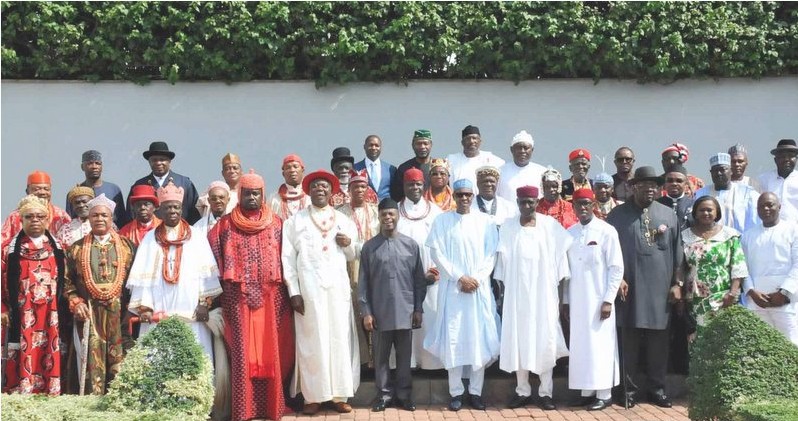
Leaders of the Niger Delta region have presented a 16-point demand to President Muhammadu Buhari, handing out proposals they say would help restore peace to the oil-rich region.
The demands were presented Tuesday at a meeting between the leaders and the president.
Governors and ministers from the region, alongside political leaders including Edwin Clark and former governor, Victor Attah, were at the meeting.
The meeting was attended by over a hundred representatives from the region.
President Buhari admitted that there were no quick fixes to the region’s problems.
Top on the list of demands is the relocation of the administrative and operational headquarters of major International Oil Companies (IOCs) to the Niger Delta region. The leaders say the decision would fast-track the development of the region.
The region’s leaders, under the aegis of Pan Niger Delta Forum, also demanded the clean-up of other communities affected by spill, besides Ogoniland.
They also asked for a review of the amnesty programme’s core mandate of providing a robust exit strategy, to ensure that those trained have jobs to return to or are given stipends.
Briefing journalists after the closed-door meeting, the Minister of State for Petroleum, Ibeh Kachikwu, alongside the Minister of Niger Delta, Usani Usani, Edwin Clarke, King Alfred Diette Spiff, the Amayanabo of Twon-Brass and Francis Tabai, a retired justice, said the meeting was the first of several meetings that would hold quarterly in different states in the region.
They said the dialogue had already begun to yield results as daily oil production had reached 2.1 million barrel.
“What that means is that it is going to be an ongoing engagement. It will never finish. The Ministry of Petroleum is continuing a quarterly meeting involving the oil companies who fairly beaten up a little bit today and the governors and the stakeholders which will happen once every 3 months,” Mr. Kachikwu said.
“The first one is going to happen in Uyo in December and we are going to rotate that between the states so that we will have a platform irrespective of the negotiation that is going on to deal with the issues and continue.
“The reality is that as of today and this morning, we are at 2.1 million barrels production. That’s substantial. That would not have happened without efforts that went behind through the royal fathers and leaders, through the militant leaders. A lot of behind-the-scene engagements had taken place and will continue to take place,” he said.
The oil minister said the president, in his response, said there was no quick solution to the problems, and that he would prefer to go to the roots of the Niger Delta problems.
“He wants to dig in and find a final solution,” Mr. Kachikwu said.
Mr. Clark, who spoke on behalf of the group, said the president received the document and “will now set the ball rolling with the Minister assisting him. Then we will appoint a very capable team of experts to negotiate on our behalf”. He said the issue of the maritime university was sorted out during the meeting.
The group, in the document presented to the president by King Spiff, asked for economic development and empowerment for the region.
He called for the implementation of the Brass LNG and fertiliser plant project, including the NLNG Train 7 in Bonny, and a review and update of the national gas master plan to integrate the economic interests and industrialisation of the region amongst others.
The leaders also demand an inclusive participation in oil industry and ownership of oil blocs.
They also want a fast track of key regional critical infrastructural projects in the region, including the East-West road, and the full implementation of the rail project that is designated to run through the Niger Delta region to Lagos.
The other issues are: The issue of increased military presence in the Niger Delta which has resulted in the invasion of communities, displacement of persons, harassment and other forms of human rights abuse.
They demanded the prompt take-off of Maritime University, and proposed that contracts for the security surveillance and protection of oil and gas infrastructure should be handled by communities rather than individuals.
The representatives also called for increase the restructuring and funding of the Niger Delta Development Commission and the strengthening of the Niger Delta Ministry.
The leaders also supported the call for fiscal federalism and urged that federal government to treat the matter expeditiously.

